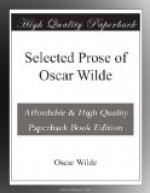In making this selection, with the valuable assistance of Mr. Stuart Mason, I have endeavoured to illustrate and to justify the critical appreciations of both Dr. Bendz and Mr. Holbrook Jackson, as well as to afford the general reader a fair idea of Wilde’s variety as a prose writer. He is more various than almost any author of the last century, though the act of writing was always a burden to him. Some critic acutely pointed out that poetry and prose were almost side-issues for him. The resulting faults and weakness of what he left are obvious. Except in the plays he has no sustained scheme of thought. Even “De Profundis” is too desultory.
For the purpose of convenient reference I have exercised the prerogative of a literary executor and editor by endowing with special titles some of the pieces quoted in these pages. Though unlike one of Wilde’s other friends I cannot claim to have collaborated with him or to have assisted him in any of his plays, I was sometimes permitted, as Wilde acknowledges in different letters, to act in the capacity of godfather by suggesting the actual titles by which some of his books are known to the world. I mention the circumstance only as a precedent for my present temerity. To compensate those who disapprove of my choice, I have included two unpublished letters. The examples of Wilde’s epistolary style, published since his death, have been generally associated with disagreeable subjects. Those included here will, I hope, prove a pleasant contrast.
ROBERT ROSS
HOW THEY STRUCK A CONTEMPORARY
There is such a thing as robbing a story of its reality by trying to make it too true, and The Black Arrow is so inartistic as not to contain a single anachronism to boast of, while the transformation of Dr. Jekyll reads dangerously like an experiment out of the Lancet. As for Mr. Rider Haggard, who really has, or had once, the makings of a perfectly magnificent liar, he is now so afraid of being suspected of genius that when he does tell us anything marvellous, he feels bound to invent a personal reminiscence, and to put it into a footnote as a kind of cowardly corroboration. Nor are our other novelists much better. Mr. Henry James writes fiction as if it were a painful duty, and wastes upon mean motives and imperceptible ‘points of view’ his neat literary style, his felicitous phrases, his swift and caustic satire. Mr. Hall Caine, it is true, aims at the grandiose, but then he writes at the top of his voice. He is so loud that one cannot bear what he says. Mr. James Payn is an adept in the art of concealing what is not worth finding. He hunts down the obvious with the enthusiasm of a short-sighted detective. As one turns over the pages, the suspense of the author becomes almost unbearable. The horses of Mr. William Black’s phaeton do not soar towards the sun. They merely frighten the sky at evening




